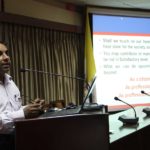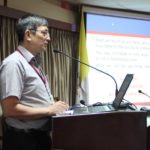A seminar organized by Caritas Sri Lanka – SEDEC was held on the above subject, in view of the forthcoming Local Government elections today, on 08th January 2018. Mr. Rohana Hettiarachchi, the Executive Director of Peoples Action for Free and Fair Election (PAFFREL), which was formed in 1987 primarily to observe elections, presided. Civil society members, Priests, Religious and staff of SEDEC and Seth Sarana participated in the event.
Mr. Hettiarachchi explained how the new system for the Local Government Elections would take place and briefed on the methodology of calculating the number of councilors for each electorate. As the total number of councilors elected would be double in size numbering 8,356 from 4,486 , he emphasized on the importance of having a mechanism to monitor the services they are going to deliver during the 4 year period, when they would be in office.
Unlike the earlier electoral system, the focus at this Local Government Election is more on the committed individuals who are keen and responsible for the development of their village or town, and this has laid foundation for a healthier political environment and culture. Mr. Hettiarachchi said though at this juncture one cannot envisage a total transformation from the party based politics, at least the new electoral system provides first steps in transforming our societies and its people towards responsible use of the franchise by voters in electing credible and honest local representatives to serve their constituencies. He also did not forget to mention about the power of people which had made huge changes in the recent political timeline of Sri Lanka. He pointed out how people’s movements and the work of civil society organizations became the source for the envisaged Good Governance practices.
Referring to SEDEC, he said, organizations of this nature could do a lot by creating awareness and informing the public as to how they should select their representatives to the Local Governments. He said under the ‘March 12 Movement’, they are reaching out to the grass root level communities and distribute leaflets and scorecards to help the voters to measure and comprehend the competencies and credibility of nominated councilors in their villages.
They have listed following recommendations in the leaflets,
- As the voters do not get a chance in selecting their councilors, to influence your political party to nominate suitable candidates,
- If your political party fail to do so, inform your local leaders that you are to extend your support to other political party or an independent group which have nominated suitable candidates,
- To voice out against nominating corrupted individuals as candidates,
- To rally around competent , creative and honest candidates irrespective of political party,
- To have the maximum benefits of electing female councilors, to influence your local leadership to nominate competent, creative and honest females candidates,
- To talk about the upcoming local elections among civil societies and at village level meetings to influence people to select only the suitable candidates to the local leadership,
- To engage fully as a responsible citizen in creating a new political culture,
- Though women have a 25% stake in the representation, to influence your local party leadership to create space for the competent women to compete under the ward-based electoral system,
- To influence your local party leadership to have sufficient representation in the nomination process for youth,














